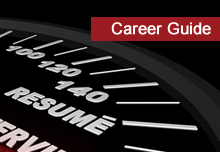What makes a good CV: Tips
There is no single "correct" way to write and present a CV but the following general rules apply:
Provide Evidence
- Be honest: CVs are not legal documents and you can't be held liable for anything within, but if a recruiter picks up a lie you will be rapidly rejected. An application form which you have signed to confirm that the contents are true is however a legal document and forms part of your contract of employment if you are recruited.
- Work out what qualifications, experience and skills are required for the jobs you are considering and think of what you have done that matches those attributes.
- Be specific and provide details and evidence to justify your claims.
Writing Style: Tips on Presentation
- Your CV should be carefully and clearly laid out - not too cramped but not with large empty spaces either. Use bold and italic typefaces for headings and important information .Set your margins evenly (right and left sides). Have an even amount of space between each heading.
- Each page should be on a separate sheet of paper. Put your name in the footer area so that it appears on each sheet.
- Make sure the spelling is correct. Have someone else to check and read your CV
- Do not use complex words and keep sentences short.People who use simple, clear language are rated as more intelligent.
- Start every sentence with a verb or action word.
- Print to good quality plain white A4 paper only.
- Avoid using too small Fonts. A recommended font size is 11 or 12.
Length
- In general, a new graduate's CV should cover no more than two sides of A4 paper
- Try to use a maximum of 6 bullet points together, each bullet not more than one or two sentences.
Work History/ Professional Experience
- Concentrate mostly on achievements and responsibilities. Show what you achieved for the company during your work there.
- Don't re-write your current job description. When listing your various jobs, include details which illustrate exactly how they have given you the skills which will be useful.
- Don't include reasons for leaving.
- Only include recent jobs.
- Include any voluntary or work placement activities. The employer will be interested in the quality of experience whether or not it was paid.
Education
- Include honors if awarded.
- Give more detail to the higher qualifications listed such as degrees and masters.
- Give full course details and dates-if needed.
- Write 'degree expected' if you have not yet graduated.
What Not To Include In Your CV
- Don't include any negatives or anything critical.
- Don't include poor grades, or unfortunate work experiences.
- Don't include references unless specifically requested - they can be requested upon interview.
- Don't include a photograph unless specifically requested
- Do not include matters about your health or any disabilities you have.
- Do not include any political affiliations.
- Don't include weight, height, marital status or children you have.
- Don't include humor.
- Don't show your existing salary or expected salary unless requested.
- Do not include 'reason for leaving' from your last job
- Do not use graphics or images.
- Do not use any abbreviations as these can be very confusing and distracting
- Do not use jargon or colloquial language.
- Do not type, 'CV', 'Curriculum vitae' as the title. You should rather put your name so the reader would know whose Curriculum Vitae he/she is reading.
Common Mistakes
- Misspelling the name of the company or the addressee.
- Not having a reply address on the CV. Remember to add all your contact details name, telephone number, mobile, email, and address so that the potential employer can reach you.
- Trying to be amusing
- Using lower case i for the personal pronoun: "i have excellent communication skills”
- Spelling mistakes: Use the spell-check tool, but remember that the best proofreader is another person. Be sure that there are no spelling errors, poor word choice, or misuse of language. These mistakes are not acceptable as it might appear that you are insufficient to do the job.
- Do not use the same verb to describe your work experience. Use a variety of action verbs to prove your transferable and diverse skills.
- Leaving out dates: Include dates because leaving them out might seem like you are trying to hide certain information.
- Using someone else's words .It can be obvious that what is written is not in your own words when you do not speak like you write. Prepare your CV in your own words!
- Unprofessional email address. Use an email address that is professional. The use of email address such as spiderman @example.com, is not likely to impress an employer!





